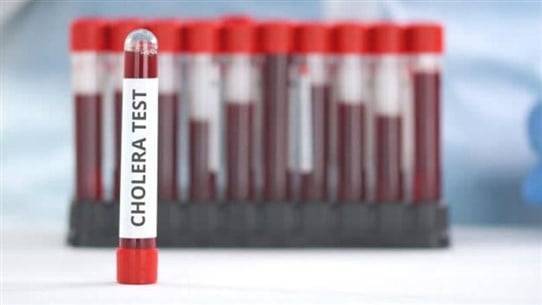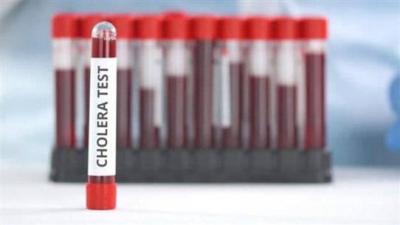Minister of Public Health in the caretaker government, Firas Al-Abyad, toured Tripoli with a delegation from the ministry accompanied by the representative of the World Health Organization in Lebanon, Abdul Nasser Abu Bakr, Deputy Representative of UNICEF in Lebanon, Etty Hegeiner, a delegation from the UN Refugee Agency in Lebanon led by Yuli Kimshi, the director of North Lebanon Water Institution, Khaled Obeid, the director of Tripoli governmental hospital, Nasser Adra, and the head of the hospitals and dispensaries department in the Ministry of Health, Dr. Hicham Fawaz, to assess the epidemiological situation and the measures taken to respond to the cholera outbreak and determine the needs.
The first stop was at the wastewater treatment plant, followed by the Lebanese University laboratory, where Al-Abyad was briefed by officials on the preparations made in the laboratory to cope with the outbreak and provide test results swiftly. He then held a meeting at the Independence Hall in the Tripoli Serail with the Disaster and Crisis Management Committee, attended by the Secretary of the Governorate, Qaimqam Iman Al-Rafai, the mayor of Tripoli, Ahmad Qamar Al-Din, the president of the Federation of Municipalities of the North, Hassan Ghamrawi, representatives from the Red Cross and civil society, and several committee members.
In a press conference, Al-Abyad stated, "There was a discussion during the meeting about the measures taken and those that will be taken to combat the spread of cholera. A plan was also developed to limit the spread of this epidemic, and it was agreed on the necessity of testing water from filling centers in tanks, from private well owners, and various public and private schools in coordination with the North Lebanon Water Institution, supported by the Lebanese Red Cross, which will conduct rounds at water filling centers, in cooperation with the concerned municipalities and health monitors. Our visit today to Tripoli and the northern areas is to follow up on the cholera crisis, as the ministry announced yesterday that the number of cases has exceeded 50 infected individuals and 7 deaths."
He added, "Our first stop was the wastewater treatment station. The cholera crisis is not limited to the health sector but extends to the condition of health networks, from providing drinking water to sewage networks, and ensuring a sound and safe environment free from germs that allows us to at least prevent this epidemic. We want to ensure the continuity of our work, especially in the sewerage and wastewater treatment system. Therefore, we need a continuous power supply, and we will monitor the status of pumping stations and address all leaks. Tanks that transport wastewater from the city to the treatment center will be disinfected at the source to prevent any potential contamination. The second stop in our tour was the Lebanese University laboratories located in Tripoli, which have high-level technological institutions and laboratories. These labs played an important role during the COVID-19 crisis, and we consider them part of the team we work with to confront the cholera crisis. The third stop was the Tripoli Serail, where we held a meeting in the Disaster and Crisis Management Room, and we thank all attendees for participating with us in the effort to combat this epidemic."
He further stated, "A work plan and measures will be taken including: - The platform launched a few days ago for disaster management, which is a participatory platform that allows for information sharing. - The importance of testing water and spreading awareness campaigns in all regions. - The Lebanese Red Cross will follow up on water tanks, monitoring their operation, cleanliness, and disinfection."
He thanked "all participants and everyone making efforts to confront this crisis, and I believe that the efforts exerted by the Ministry of Health will limit the spread of the epidemic to prevent a large number of infections." He added, "Our meeting today must show the public our seriousness in combating this crisis and taking all necessary measures to confront the epidemic. If we look at the number of cholera cases in Lebanon, it has not exceeded 230 infected individuals, but we do not want these cases to turn into a real crisis like neighboring countries. Therefore, it is essential for us to take necessary measures now to avoid an increase in the number of patients at the hospital doors."
In response to a question, he noted, "The cholera vaccine is effective and taken orally, ensuring protection for no less than 7 days. The vaccine is important and essential, and we have been working on it with our international partners for two weeks. The requests necessary to obtain the vaccine have been prepared and sent to the companies and global organizations. As you know, the vaccine crisis is sweeping the world, and there is a shortage of available doses due to the spread of this epidemic in several countries. However, we announce that a large quantity has been reserved for Lebanon, and we expect good news regarding the procurement of vaccines soon. About 10,000 doses have been secured so far and will arrive in Lebanon within ten days, directed primarily to medical and emergency teams that face cholera hotspots daily and will be allocated to densely populated areas like prisons, and we expect to receive large quantities that will allow us to start distributing them in schools and other institutions."
He continued, "Over the past three years, we lost the school year due to COVID-19. Therefore, anyone thinking about closing schools must understand the significant responsibility towards our children and their education. Thus, in coordination with the Ministry of Education and Higher Education and UNICEF, we are working to secure the necessary sanitizers for schools, in addition to the sanitizers that have been available since the COVID-19 crisis. We must work diligently to prevent the spread of cholera and strive to eliminate ignorance in our society by making a sincere effort to keep our schools open."
He concluded, "The illegal crossings spread along the Lebanese-Syrian border, which are difficult to control, pose a crisis in the health situation, but we have discussed this issue with the Ministry of Interior and are waiting to see what can be done in this regard."




